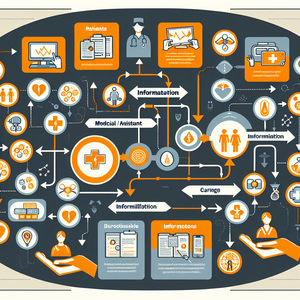The Rise of the Tech-Savvy Warehouse Manager

The role of a warehouse manager has undergone a significant metamorphosis over the past few decades. Traditionally, the responsibilities of a warehouse manager revolved around manual inventory checks, coordinating shipments, and ensuring operational efficiency. However, the advent of automation, AI, and other advanced technologies has fundamentally altered these processes. Today, the modern warehouse is equipped with technologies such as autonomous mobile robots (AMRs) to transport goods, machine vision systems for quality control, and predictive analytics platforms for inventory forecasting. These innovations have created a new set of challenges and opportunities for warehouse managers. According to a 2023 Deloitte report, 73% of warehouse leaders identified the integration of advanced technologies as their top priority for the next five years. This underscores the growing importance of managers who can seamlessly bridge the gap between traditional operational expertise and cutting-edge technological fluency.
Essential Skills for the Tech-Savvy Warehouse Manager
The rise of automation and AI in warehouses has necessitated a new skill set for managers. It is no longer sufficient to rely solely on organizational and communication skills. A tech-savvy warehouse manager must possess a unique combination of technical, analytical, and leadership abilities to excel in this evolving role. Key skills include digital literacy, robotics and automation knowledge, data analysis skills, adaptability, and human-robot collaboration skills. For example, managers must be proficient in tools like warehouse management systems (WMS) and enterprise resource planning (ERP) platforms, understand the basics of robotics, analyze data to optimize workflows, adapt to rapidly changing environments, and ensure seamless collaboration between robots and human employees.
Real-World Examples of Tech-Savvy Leadership
The benefits of tech-savvy warehouse management can be seen in some of the world’s most successful companies. For example, Ocado, a UK-based online grocery retailer, uses advanced robotics and AI to process orders in as little as five minutes. FedEx has incorporated AI and augmented reality (AR) tools to improve inventory management and decision-making. Even mid-size warehouses are adopting automation, with a 2023 survey revealing that 62% had implemented some form of automation. Those led by tech-savvy managers reported a 25% increase in operational efficiency.
Addressing Challenges in the Transition
While the rise of the tech-savvy warehouse manager offers numerous benefits, the transition is not without its challenges. Key challenges include the skills gap, cost constraints, and workforce resistance. A 2023 study by McKinsey found that only 38% of current warehouse managers felt confident in their ability to manage advanced technologies. Companies must invest in training programs to upskill their workforce. Cost constraints can be mitigated as technologies become more affordable and scalable, with government grants and partnerships helping smaller companies. Workforce resistance can be addressed by emphasizing technology as an enabler rather than a replacer of jobs and by upskilling workers to handle more complex tasks.
The rise of the tech-savvy warehouse manager marks a pivotal transformation in the logistics industry. As automation, robotics, and AI continue to reshape warehouse operations, managers who can harness these technologies will become indispensable. These leaders will not only drive efficiency and cost savings but also ensure that human workers remain integral to the equation, fostering collaboration between humans and machines. Ultimately, the most successful warehouse managers will be those who embrace change, continuously upskill, and strike a balance between leveraging technology and optimizing human potential.
Warehouse Automation Specialist
Amazon, DHL, Zebra Technologies, and small-to-mid-size logistics firms adopting automation
Core Responsibilities
Design and implement automation systems, such as robotics and conveyor systems, to optimize warehouse workflows.
Collaborate with vendors and internal teams to deploy technologies like autonomous mobile robots (AMRs) and machine vision systems.
Monitor performance metrics of automated solutions and troubleshoot issues to maintain operational efficiency.
Key Skills
Expertise in warehouse management systems (WMS) and robotics programming.
Strong analytical skills for identifying automation opportunities and ROI analysis.
Familiarity with industrial control systems like PLCs (Programmable Logic Controllers).
Demand Planning and Inventory Optimization Analyst
Walmart, Procter & Gamble, Unilever, and e-commerce platforms like Shopify merchants
Core Responsibilities
Leverage AI-driven predictive analytics tools to forecast inventory needs and minimize stockouts or overstocking.
Analyze historical sales data, market trends, and seasonal demand patterns to inform purchasing decisions.
Develop models to improve warehouse storage efficiency and reduce holding costs.
Key Skills
Proficiency in data analytics tools such as Tableau, Python, or R.
Experience with ERP software like SAP or Oracle to manage supply chain data.
Strong problem-solving skills to address demand fluctuations and logistical bottlenecks.
Human-Robot Interaction (HRI) Specialist
Boston Dynamics, Ocado, Siemens, and third-party logistics providers
Core Responsibilities
Develop and refine workflows that integrate human workers and robotic systems to improve warehouse productivity.
Train employees on safe and efficient collaboration with robots, ensuring ergonomic practices.
Monitor robot performance and human feedback to make iterative improvements in processes.
Key Skills
Knowledge of robotic software frameworks like ROS (Robot Operating System).
Experience in change management to address workforce concerns about automation.
Strong interpersonal skills to facilitate communication between technical and non-technical teams.
AI Systems Implementation Consultant (Warehouse Focus)
IBM, Deloitte, Blue Yonder, and tech startups focused on supply chain optimization
Core Responsibilities
Guide companies in selecting and deploying AI technologies tailored for warehouse operations, such as predictive analytics and machine learning models.
Collaborate with stakeholders to customize AI tools for specific needs, such as inventory forecasting or labor optimization.
Train warehouse managers and staff on best practices for utilizing AI systems effectively.
Key Skills
Expertise in machine learning algorithms, data visualization tools, and AI platforms.
Strong project management skills to oversee end-to-end implementation.
Familiarity with supply chain workflows and warehouse technology ecosystems.
Logistics Technology Trainer
FedEx, UPS, Ryder, and training-focused consultancies
Core Responsibilities
Develop and deliver training programs to upskill warehouse teams in using new technologies, including WMS, robotics, and data analytics tools.
Create comprehensive guides and hands-on workshops for employees at all skill levels.
Evaluate the effectiveness of training programs and adapt them based on feedback and technology updates.
Key Skills
Strong instructional design capabilities, with experience in creating training materials for technical systems.
Familiarity with logistics technologies, including automation software and hardware.
Excellent communication and presentation skills to convey complex concepts in a clear and engaging manner.


